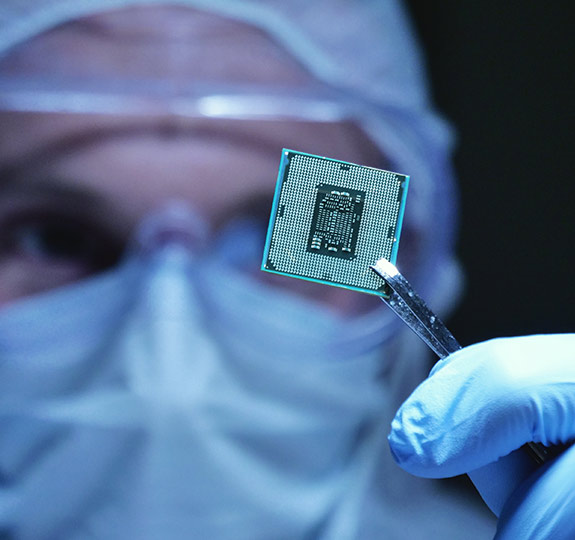From 5G to space to cyber, the United Arab Emirates (UAE) has been investing heavily in transforming itself into a regional tech power. The next geo-technology medium for the UAE is semiconductors, a strategic battleground in the U.S.-China tech Cold War. Leveraging its economic capabilities, the UAE entered the semiconductor space as the primary investor in the U.S.-based manufacturer GlobalFoundries (GF). While the semiconductors industry is one of the most capital-intensive industries globally, the UAE’s strategic investment in the sector is part of a larger Emirati strategy to pivot to deep tech and position the country as a global tech leader under Economic Vision 2030.
By Mohammed Soliman

Entering the Semiconductor Game
In an effort to position itself as a tech power outside of the Middle East, the UAE has been investing extensively in niche technology sectors that are front and center in the global economy. The semiconductor industry is a prime example. In 2011, as part of the UAE’s effort to diversify its economy away from energy production, Abu Dhabi's Mubadala Investment Company, a leading sovereign investor, acquired Advanced Technology Investment Co. (ATIC), the parent company of the California-based semiconductor manufacturer GF. GF is one of the top five chipmakers globally, producing advanced semiconductors for companies such as Apple, Intel, and Amazon. It is the third-largest semiconductor producer, behind only TSMC and Samsung. Recently, GF announced plans to expand by building a new $4 billion manufacturing plant in Singapore.
Mubadala seeks partnerships in cutting-edge technology, recently investing in sectors like energy, technology, finance, pharma intelligence, defense technology, aerospace, and other transportation sciences. In May 2022, it signed a memorandum of understanding with French energy and utility firm Engie to explore the development of vehicle recharging in the Middle East and North Africa region. Investing in the semiconductors industry is very much in line with Mubadala’s strategy and forward-thinking approach.
According to Khaldoon al-Mubarak, Mudabala’s managing director and CEO, the semiconductor industry will double “within eight to ten years” and “double again after an additional four to five years.” As many things that we use every day require semiconductors, from appliances to vehicles, the demand for them outweighs the supply, he noted. Al-Mubarak added that “there's [only] five foundry businesses, global foundry businesses, four of which are in Asia,” while GF is in the United States, Europe, and Asia, giving the company an edge over its competitors.
While there hasn’t been any word on whether the UAE will try to build up a semiconductor industry at home, Abu Dhabi remains a strong investor in the sector. The UAE’s Khalifa University is one of the region’s first academic institutions to offer semiconductor design training. Most recently, the UAE’s Next Orbit Ventures and Israel’s Tower Semiconductor established a joint venture to invest $3 billion to set up a chip-making plant in India.
By investing in its tech ecosystem, bringing international tech companies home, and developing its human capital, the UAE has become the region's leading digital economy. The UAE’s investment in GF is part of a larger Emirati ambition to shift its focus to deep tech and establish the country as a worldwide tech leader, not one that is limited to the Middle East. With the UAE’s national vision of becoming a global leader in tech and innovation, the Emirates may well bring semiconductor production home in the long run.
Source https://nationalinterest.org/blog/techland-when-great-power-competition-meets-digital-world/strategic-start-ups-uae-betting-big







